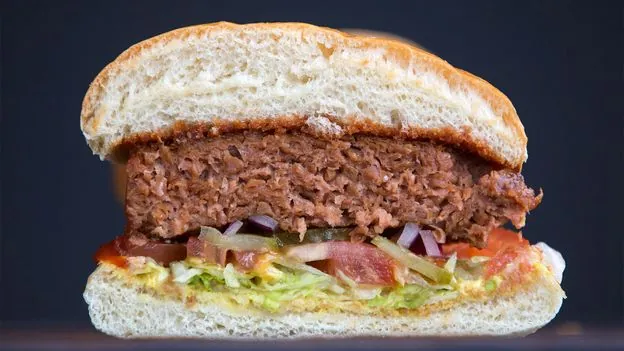
The Rising Anxiety Around Ultra-Processed Plant-Based Foods: Should We Be Concerned?
2024-10-12
Author: Kai
In recent years, the popularity of plant-based diets has surged, leading to a marked increase in the consumption of ultra-processed plant-based foods (UPFs). While these products offer practical alternatives to traditional meats and dairy, they raise concerns about health impacts, with critics sounding alarms about their nutritional value. But is this anxiety justified?
For many individuals in industrialized societies, completely avoiding ultra-processed foods—like sugary cereals, packaged snacks, or ready-made meals—is nearly impossible. In fact, ultra-processed products have become staples in our diets due to their convenience, appealing flavors, and affordability, making them a go-to choice for millions.
Understanding Ultra-Processed Foods
The term "ultra-processed" encompasses a broad range of food items, often characterized by the presence of artificial ingredients, additives, and high levels of sugar, salt, or unhealthy fats. European policies and the Nova classification system categorize foods based on their processing levels, indicating that not all processed foods are harmful. However, Rauber, a nutritional epidemiologist, emphasizes the need to focus on the health implications of ultra-processed items, which typically contain dubious ingredients unfamiliar to most home cooks.
The Health Implications of UPFs
Notably, research has shown that higher intakes of ultra-processed foods are linked to various health issues. A UK study from 2023 revealed that each 10% increase in UPFs led to a 2% greater risk of cancer, and with even higher rates for specific cancers like ovarian cancer. With obesity directly correlated to UPF consumption, these foods tend to be less satiating and addictive, contributing to excess caloric intake.
This concern is magnified among those opting for plant-based diets. A 2024 UK study found a troubling association between increased caloric intake of plant-based UPFs and a 5% heightened risk of cardiovascular disease. In contrast, unprocessed plant foods were associated with a lower risk of such diseases.
Is All Processing Equal?
Complicating the narrative is the assumption that less processed means healthier. Red meats, while less processed, have also been linked to severe health outcomes. Ultimately, a nuanced understanding of dietary patterns emerges as crucial; what you consume as a whole—rather than isolating individual items—holds significant implications for health.
Patterns and Preferences in Plant-Based Eating
Recent studies indicate that while vegan diets may include more ultra-processed foods—comprising 39.5% of energy intake for vegans—they also tend to include greater amounts of unprocessed foods. People new to plant-based eating often reach for substitutes heavy in processing, but seasoned vegans balance this with whole food options.
Consumer Awareness and Industry Response
The narrative surrounding UPFs is heavily influenced by social perceptions and the stigma against processed foods. Even as pressure mounts for food manufacturers to create healthier options, experts warn against oversimplifying the issue. A notable finding suggested that plant-based substitutes often outperform meat products nutritionally, with vegan options like sausages yielding better nutrition scores than their meat counterparts.
Amid growing public discourse on ultra-processed foods, nations are reevaluating food policies. Brazil is considering imposing stricter regulations and taxes on UPFs—approaches akin to tobacco control.
A Balanced Perspective for Consumers
Nutrition experts stress that while it's wise to limit ultra-processed food consumption, not all UPFs should be demonized. The overarching principle is to prioritize a balanced diet rich in whole foods like fruits, vegetables, nuts, seeds, and legumes.
Ultimately, instead of fearing ultra-processed plant-based foods, consumers should strive for an overall healthy dietary pattern. If a few UPFs find their way into your diet without dominating it, they shouldn't be a significant concern. Moderation is key—savoring these items occasionally while focusing on nutritious, whole-food options will guide individuals toward healthier eating.
As public interest in plant-based eating continues to rise, the dialogue surrounding ultra-processed foods will remain critical. Are these innovations in our diets making us healthier or merely affirming our culinary cravings? The debate is far from over.





 Brasil (PT)
Brasil (PT)
 Canada (EN)
Canada (EN)
 Chile (ES)
Chile (ES)
 España (ES)
España (ES)
 France (FR)
France (FR)
 Hong Kong (EN)
Hong Kong (EN)
 Italia (IT)
Italia (IT)
 日本 (JA)
日本 (JA)
 Magyarország (HU)
Magyarország (HU)
 Norge (NO)
Norge (NO)
 Polska (PL)
Polska (PL)
 Schweiz (DE)
Schweiz (DE)
 Singapore (EN)
Singapore (EN)
 Sverige (SV)
Sverige (SV)
 Suomi (FI)
Suomi (FI)
 Türkiye (TR)
Türkiye (TR)